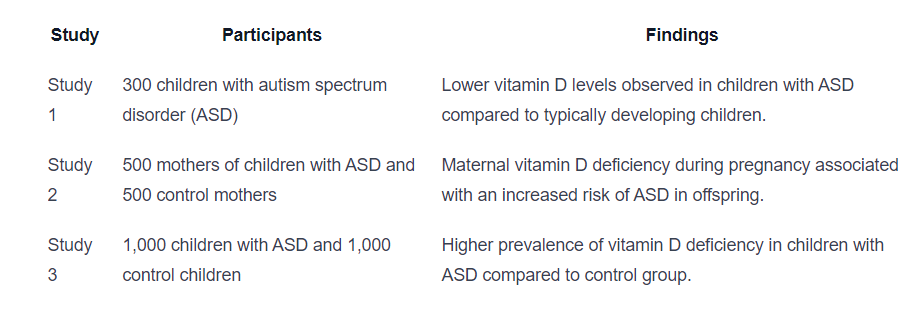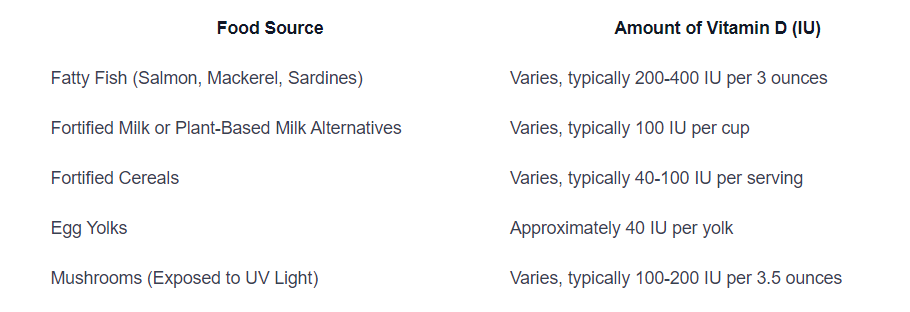Vitamin D and Autism: Is There A Connection?
Unveiling the link between vitamin D and autism: Can this essential nutrient hold the key? Explore the latest research findings and potential benefits.

Understanding Autism and Vitamin D
To unlock the potential connection between autism and vitamin D, it is important to first gain an understanding of both autism and the significance of vitamin D in the body. In this section, we will provide a brief overview of autism, discuss the importance of vitamin D, and explore the initial observations of a possible connection.

Brief Overview of Autism
Autism, also known as Autism Spectrum Disorder (ASD), is a complex developmental condition that affects communication, social interaction, and behavior. It is characterized by a wide range of symptoms and can vary in severity from person to person. Individuals with autism may have challenges with social skills, repetitive behaviors, sensory sensitivities, and communication difficulties.
Importance of Vitamin D in the Body
Vitamin D is an essential nutrient that plays a vital role in various bodily functions. It is well-known for its role in bone health, as it helps the body absorb calcium and maintain strong bones. Additionally, vitamin D is involved in immune function, cell growth, and inflammation regulation. It also supports the health of the brain, muscles, and nerves.
Initial Observations of the Connection
Initial observations have suggested a possible link between vitamin D and autism. Some studies have found that individuals with autism tend to have lower levels of vitamin D compared to those without the condition. However, it is important to note that these findings do not establish a cause-and-effect relationship. Further research is needed to fully understand the connection between vitamin D levels and autism.
Understanding the relationship between vitamin D and autism is a complex task that requires careful examination of research findings and mechanisms of action within the body. In the following sections, we will explore the studies linking vitamin D levels and autism, as well as the potential benefits of vitamin D for individuals with autism.
Research Findings
When exploring the potential connection between vitamin D levels and autism, numerous studies have been conducted to shed light on this intriguing relationship. In this section, we will delve into the research findings that link vitamin D levels to autism and examine the mechanisms of action within the body.
Studies Linking Vitamin D Levels and Autism
Several studies have investigated the association between vitamin D levels and autism. While the exact nature of this connection is still being explored, research has presented intriguing findings. Here are some key studies that have contributed to our understanding:

These studies provide valuable insights into the potential link between vitamin D levels and autism. However, it's important to note that further research is needed to establish a definitive causal relationship and understand the underlying mechanisms.
Mechanisms of Action in the Body
The mechanisms through which vitamin D may influence autism are still being investigated. Vitamin D plays a crucial role in various biological processes, including neurological development and immune function, which are relevant to autism. Here are some potential mechanisms of action in the body:
- Neurodevelopment: Vitamin D is involved in brain development and neuroprotective processes. Adequate levels of vitamin D during critical periods of brain development may support optimal neuronal growth and connectivity.
- Immune Regulation: Vitamin D has immunomodulatory properties, influencing the immune system's response and reducing inflammation. Dysregulation of the immune system has been observed in individuals with autism, and vitamin D may play a role in immune system function.
- Gene Expression: Vitamin D is known to influence gene expression, potentially impacting genes associated with autism. Epigenetic modifications mediated by vitamin D may contribute to the development and manifestation of autism.
While these mechanisms provide a theoretical framework for understanding the potential influence of vitamin D on autism, more research is required to fully elucidate the complex interplay between vitamin D levels, biological processes, and the development of autism.
By studying the link between vitamin D levels and autism, researchers aim to gain insights into potential preventive measures and therapeutic interventions. However, it is important to note that further research is needed to establish a conclusive relationship and determine the full extent of vitamin D's impact on autism.
Potential Benefits of Vitamin D for Autism
Exploring the connection between vitamin D and autism has revealed potential benefits that vitamin D may offer in relation to this neurodevelopmental disorder. Let's delve into the role of vitamin D in brain development and its impact on behavior and symptoms associated with autism.
Role of Vitamin D in Brain Development
Vitamin D plays a crucial role in the development and functioning of the brain. It acts as a hormone that regulates the expression of numerous genes involved in brain development, neural connectivity, and neurotransmitter synthesis. Adequate levels of vitamin D during critical periods of brain development are important for optimal neurodevelopment.
Research suggests that vitamin D may influence the growth and differentiation of neurons, as well as the production of neurotrophic factors that support neuronal survival and connectivity. It may also modulate the immune response within the brain, which is relevant to autism as there is evidence of altered immune function in individuals with the disorder.
Impact on Behavior and Symptoms
Studies investigating the potential benefits of vitamin D for individuals with autism have explored its impact on behavior and symptoms. While research is ongoing, some findings suggest that optimizing vitamin D levels may have positive effects.
One study found that higher vitamin D levels were associated with improved social responsiveness and reduced severity of autism symptoms. Another study reported that vitamin D supplementation was linked to a decrease in repetitive behaviors in children with autism.
However, it is important to note that the results of these studies are preliminary, and more research is needed to establish a clear cause-and-effect relationship between vitamin D and autism. Additionally, the response to vitamin D supplementation may vary among individuals with autism, highlighting the need for personalized approaches.
To better understand the potential benefits of vitamin D for autism, further research is essential. Large-scale clinical trials are needed to explore the effectiveness and optimal dosing of vitamin D supplementation in individuals with autism. Additionally, more studies are required to elucidate the underlying mechanisms through which vitamin D may exert its effects on brain development and behavior.
As the research unfolds, it is important to ensure that individuals with autism receive appropriate healthcare and interventions tailored to their specific needs. Consulting with healthcare professionals and following their guidance regarding vitamin D supplementation or other interventions is crucial to ensure the best outcomes for individuals with autism.
Factors to Consider
When exploring the connection between vitamin D and autism, it's important to consider various factors that can affect vitamin D levels in the body. These factors include sun exposure and vitamin D synthesis, dietary sources of vitamin D, and the option of supplementing vitamin D.
Sun Exposure and Vitamin D Synthesis
Sun exposure plays a crucial role in the synthesis of vitamin D in the body. When the skin is exposed to sunlight, it produces vitamin D naturally. However, several factors can influence the amount of vitamin D synthesized, such as:
- Geographic Location: Individuals living in regions closer to the equator receive more direct sunlight throughout the year, which facilitates higher vitamin D synthesis.
- Season and Time of Day: Sunlight intensity and UVB radiation, necessary for vitamin D synthesis, vary depending on the season and time of day. In general, exposure to sunlight between 10 am and 3 pm is considered optimal for vitamin D production.
- Skin Pigmentation: Melanin, the pigment responsible for skin color, can act as a natural sunscreen. Individuals with darker skin may require longer exposure to sunlight to produce adequate vitamin D compared to those with lighter skin.
While sun exposure is an important source of vitamin D, it's essential to balance the benefits with the risks of excessive sun exposure, such as sunburn and skin damage. It's recommended to consult with a healthcare professional to determine the appropriate duration of sun exposure based on individual factors.
Dietary Sources of Vitamin D
In addition to sun exposure, vitamin D can also be obtained through dietary sources. Some foods naturally contain vitamin D, while others are fortified with it. Common dietary sources of vitamin D include:

It's important to note that dietary sources alone may not provide sufficient vitamin D levels, especially for individuals with limited sun exposure or specific dietary restrictions. In such cases, supplementation may be necessary.
Supplementing Vitamin D
Supplementing vitamin D can be an option to ensure adequate levels in individuals who are at risk of deficiency or have limited sun exposure. Vitamin D supplements are available in various forms, including capsules, tablets, and liquid drops. The appropriate dosage of supplementation may vary based on factors such as age, health condition, and existing vitamin D levels.
It's crucial to consult with a healthcare professional before starting any vitamin D supplementation regimen. They can assess individual needs and recommend the most suitable dosage to achieve optimal vitamin D levels.
By considering these factors, such as sun exposure, dietary sources, and the option of supplementation, individuals can make informed decisions regarding their vitamin D levels. Understanding these factors is essential for exploring the potential connection between vitamin D and autism and its implications for overall health and well-being.
Recommendations and Future Research
As the connection between vitamin D and autism continues to be explored, there are potential implications for treatment and areas that warrant further study. Understanding these recommendations and considering future research can provide valuable insights into the role of vitamin D in autism.
Potential Implications for Treatment
The research findings on the relationship between vitamin D and autism have raised the possibility of using vitamin D supplementation as a treatment strategy. However, it's important to note that more research is needed to establish the effectiveness of this approach and determine the appropriate dosage for individuals with autism.
While vitamin D supplementation may not be a standalone treatment for autism, it could be considered as part of a comprehensive therapeutic approach. Collaborating with healthcare professionals, including pediatricians and specialists in autism, can help determine the best course of action for each individual.
Areas for Further Study
To gain a deeper understanding of the connection between vitamin D and autism, further research is necessary. Here are some areas that could be explored:
- Long-term studies: Conducting long-term studies to observe the effects of vitamin D levels on the development, behavior, and symptoms of individuals with autism. This would help establish a clearer cause-and-effect relationship.
- Optimal dosage: Investigating the optimal dosage of vitamin D supplementation for individuals with autism. Determining the appropriate dosage is essential to ensure safety and efficacy.
- Mechanisms of action: Exploring the specific mechanisms by which vitamin D influences brain development and behavior in individuals with autism. Understanding these mechanisms can provide insights into potential therapeutic targets.
- Clinical trials: Conducting well-designed clinical trials to evaluate the effectiveness of vitamin D supplementation as a treatment for autism. Randomized controlled trials with a large sample size would help establish the efficacy of this approach.
- Population-based studies: Conducting population-based studies to examine the prevalence of vitamin D deficiency in individuals with autism. This may help identify subgroups within the autism population that could benefit the most from vitamin D supplementation.
By addressing these areas of research, we can enhance our understanding of the connection between vitamin D and autism and potentially develop more effective treatments for individuals on the autism spectrum. It is crucial to continue exploring this relationship to improve the lives of those affected by autism.
Sources
https://www.autismparentingmagazine.com/vitamin-d-benefits-children-autism/
https://www.frontiersin.org/articles/10.3389/fnbeh.2022.859151
https://www.ncbi.nlm.nih.gov/pmc/articles/PMC8746934/
Similar articles
We’re here to help you

Our team is here to assist you in this process. Contact us for any assistance.
it’s easy to apply
We Accept Most Insurances
Our in-network insurance partnerships make ABA therapy more accessible to families throughout our service areas.







Our Insurance Process
We'll request your insurance details to help us verify your plan's coverage for ABA therapy. Once we've received this information, we'll walk you through your benefits, including copayments, deductibles and out-of-pocket maximums, so you know what to expect in advance.
Our team will then handle the preauthorization and all the necessary paperwork.
.svg)





















.jpeg)


































.jpeg)




.jpeg)







.jpeg)











.jpeg)
















